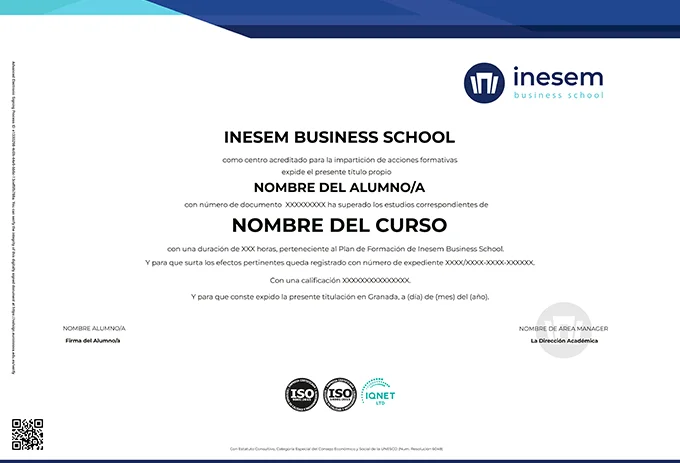- Presentación
- Temario
- Metodología
- Titulación
Descripción
¿A quién va dirigido?
Objetivos
Salidas Profesionales
Temario
UNIT 1. INTRODUCTION TO ETHICAL HACKING
- What is ethical hacking?
- - Hacker ethics
- - Values of hacker ethics
- - Phases of ethical hacking
- - Types of ethical hacking
- Legal aspects of ethical hacking
- - Ethical hacking process
- - Code of ethics and certification
- Ethical hacker profiles
- - Black-hat hacker
- - White hat hacker
- - Gray hat hackers
- - Hacktivism
UNIT 2. PHASES OF ETHICAL HACKING IN ATTACKS ON SYSTEMS AND NETWORKS
- Types of attacks
- - Classification of attacks based on system vulnerabilities
- - Classification of attacks based on the effects caused
- - Classification of attacks based on the form of action
- Ethical hacking tools
- - Independent ethical hacking tools
- - Distributions for ethical hacking and security audits
- Vulnerability testing
- - Steps to configure a pentest laboratory
UNIT 3. PHASES OF ETHICAL HACKING IN ATTACKS ON WI-FI NETWORKS
- Types of attacks
- - DDoS attacks
- - Fake AP Rogue Attacks
- Ethical hacking tools
- Types of Wi-Fi Security
- - WEP Security
- - WPA Security
- - WPA2 Security
- - RADIUS Security
- Sniffing
UNIT 4. PHASES OF ETHICAL HACKING IN WEB ATTACKS
- Types of attacks
- - SQL Injection (SQLi) Attacks
- - XSS attacks
- Ethical hacking tools
- Types of web security
- Types of security tests in web environments
- - Identification of the proxy mechanisms used
- - Enumeration of valid hosts
- - Web server profiles
UNIT 5. INTRODUCTION TO REVERSE ENGINEERING
- Reverse engineering concept
- - Software engineering, re-engineering, and forward engineering
- - Characteristics of reverse engineering
- - Abstraction level
- - Completeness
- - Directionality in reverse engineering
- - The reverse engineering process
- - Restructuring
- - Redocumentation
- Advantages of using reverse engineering
UNIT 6. TYPES OF REVERSE ENGINEERING
- Reverse data engineering
- - Data reverse engineering techniques
- - Tools for reverse data engineering
- Reverse engineering of logic or process
- - Reverse engineering techniques for logic or processes
- Reverse engineering of user interfaces
- - Reverse engineering techniques for user interfaces
- - Reverse engineering work with user interfaces
UNIT 7. CRACKING TOOLS
- Debuggers
- - Fundamental concepts for understanding debuggers
- - Hardware support for debugging
- - Breakpoints
- - Debugging information
- - Anti-debugging techniques
- - Examples of debuggers
- Disassemblers
- - How disassemblers work
- - Disassembly methods
- - Anti-disassembly techniques
- - Examples of disassemblers by operating system
- Reverse compilers or decompilers
- - Compilation concept
- - Decompiler
- - Types of decompilers
- - Phases of decompilation
- - Decompiler tools
- - Examples of decompilers
- - Other tools
Metodología
EDUCA LXP se basa en 6 pilares
Titulación

INESEM Business School se ocupa también de la gestión de la Apostilla de la Haya, previa demanda del estudiante. Este sello garantiza la autenticidad de la firma del título en los 113 países suscritos al Convenio de la Haya sin necesidad de otra autenticación. El coste de esta gestión es de 65 euros. Si deseas más información contacta con nosotros en el 958 050 205 y resolveremos todas tus dudas.
Explora nuestras Áreas Formativas
Construye tu carrera profesional
Descubre nuestro amplio Catálogo Formativo, incluye programas de Cursos Superior, Expertos, Master Profesionales y Master Universitarios en las diferentes Áreas Formativas para impulsar tu carrera profesional.
Course on Reverse Engineering and Software Cracking
